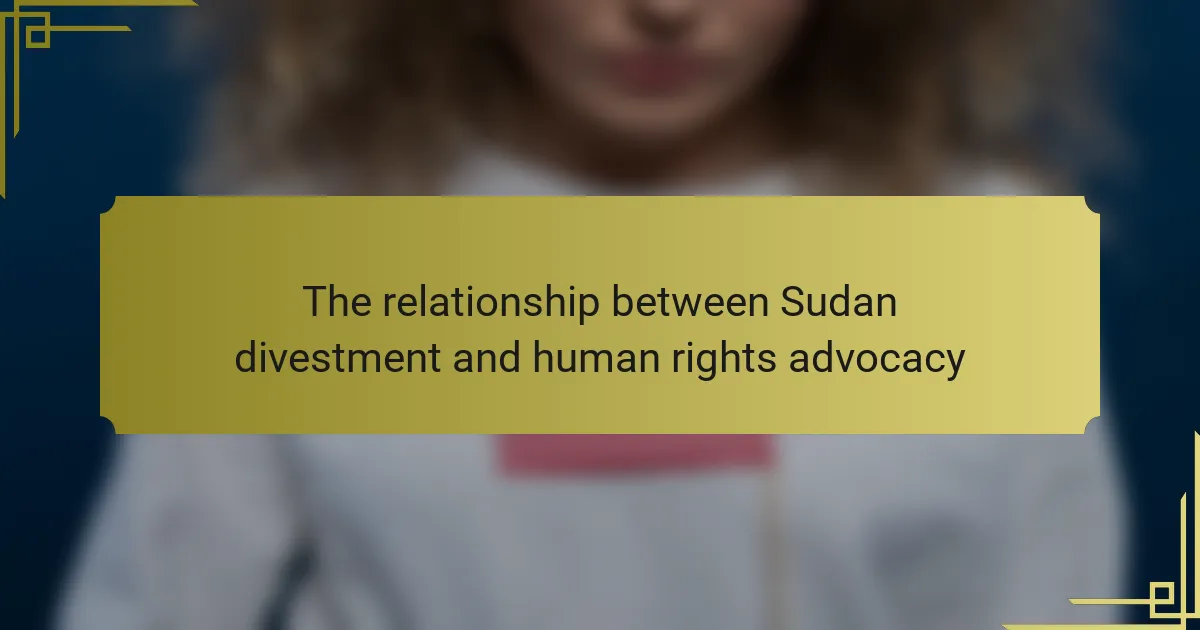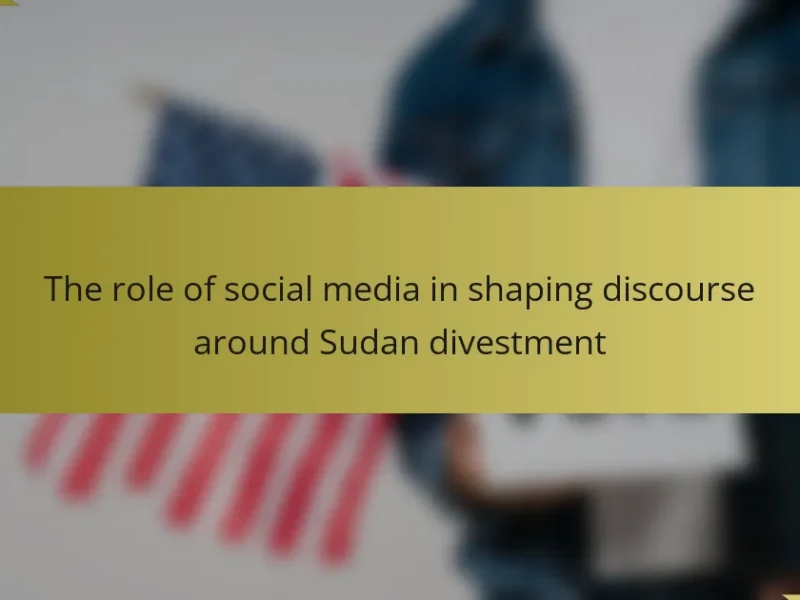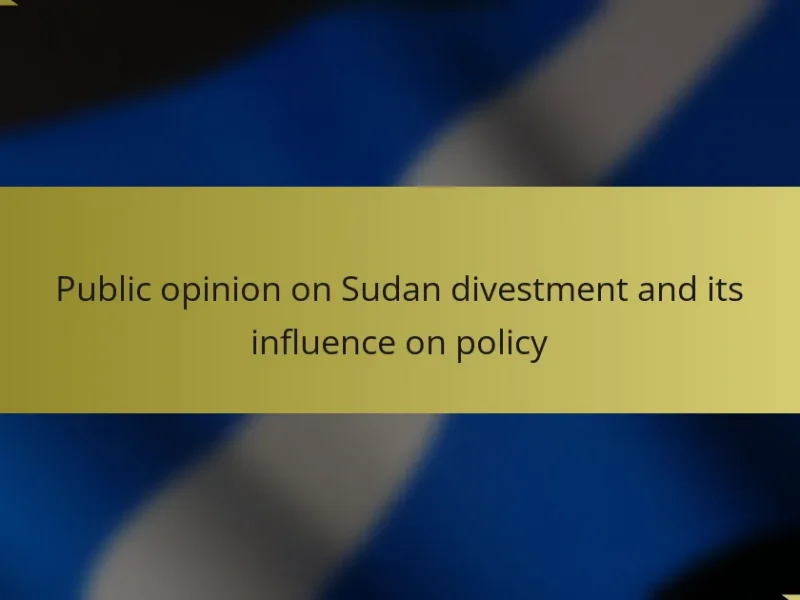Sudan divestment refers to the strategic withdrawal of investments from companies that contribute to human rights abuses in Sudan, particularly in response to the ongoing violations linked to the Sudanese government. This movement aims to apply economic pressure to improve the country’s human rights record, with a significant focus on the humanitarian crisis in Darfur. Advocacy groups, including the Save Darfur Coalition, have mobilized public support for divestment campaigns, which have influenced both corporate behavior and government policies. Legislative measures, such as the Sudan Accountability and Divestment Act of 2007, have further legitimized these efforts, highlighting the connection between economic actions and ethical considerations in the fight for social justice.
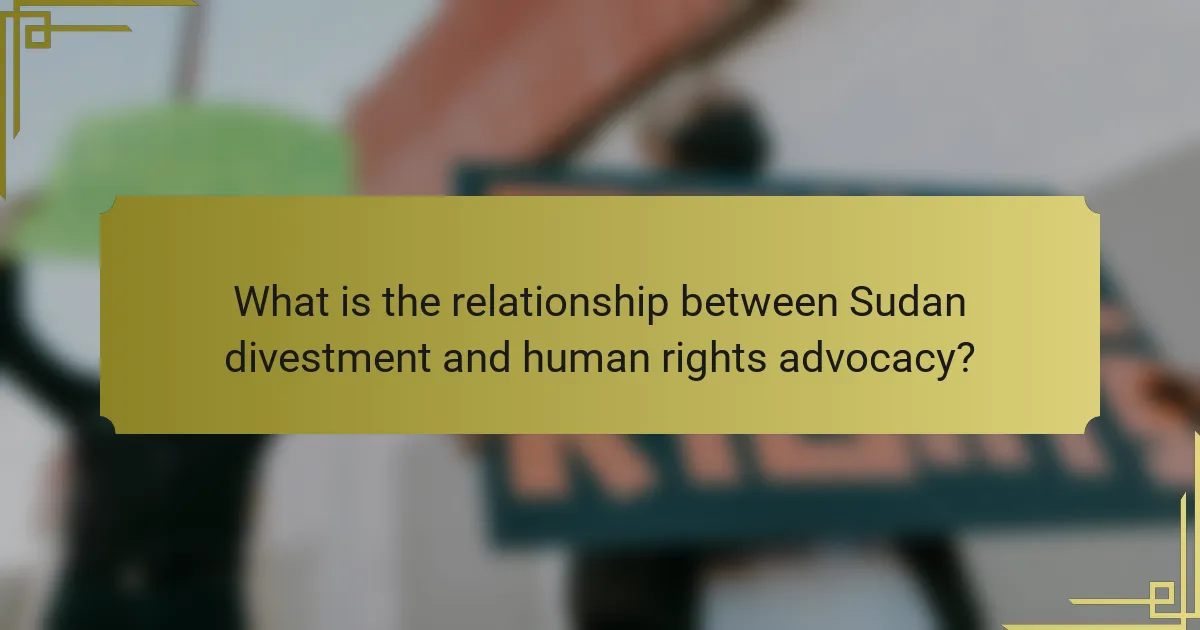
What is the relationship between Sudan divestment and human rights advocacy?
Sudan divestment is closely linked to human rights advocacy as it aims to pressure the Sudanese government to improve its human rights record. Divestment involves withdrawing investments from companies that contribute to human rights abuses. This strategy has been used by activists to highlight the plight of marginalized groups in Sudan. For example, during the Darfur crisis, divestment campaigns targeted companies linked to the Sudanese government. These campaigns sought to draw attention to the government’s involvement in violence and oppression. By divesting, advocates aim to weaken the financial support for regimes that violate human rights. Research shows that divestment can influence corporate behavior and government policies. Thus, the relationship between Sudan divestment and human rights advocacy is one of strategic action to promote social justice.
How did Sudan divestment emerge as a strategy for human rights advocacy?
Sudan divestment emerged as a strategy for human rights advocacy in response to the humanitarian crises in Sudan. Activists and organizations sought to leverage economic pressure as a means to influence government actions. This strategy gained momentum in the early 2000s during the Darfur conflict. The divestment movement aimed to withdraw investments from companies supporting the Sudanese government. Key organizations, such as the Sudan Divestment Task Force, played a pivotal role in mobilizing public support. They highlighted the link between financial investments and the perpetuation of human rights abuses. As a result, numerous states and institutions adopted divestment policies. These actions aimed to signal disapproval of the Sudanese government’s actions and promote accountability.
What historical events led to the call for divestment from Sudan?
The call for divestment from Sudan was primarily driven by the Darfur conflict, which began in 2003. This conflict involved widespread violence against civilians by government forces and militia groups. Reports indicated that over 300,000 people were killed and millions displaced. The U.S. government labeled the actions in Darfur as genocide. International human rights organizations documented severe human rights abuses, prompting public outrage. Activist groups mobilized campaigns advocating for divestment from companies operating in Sudan. These campaigns aimed to pressure the Sudanese government to cease its violent actions. The divestment movement gained traction in universities and financial institutions globally.
What role do international organizations play in Sudan divestment efforts?
International organizations play a crucial role in Sudan divestment efforts by advocating for economic sanctions and promoting ethical investment practices. They mobilize global awareness about human rights violations in Sudan. Organizations like the United Nations and Human Rights Watch provide detailed reports on the humanitarian crisis. These reports often lead to calls for divestment from companies operating in Sudan. International organizations also collaborate with governments to implement divestment policies. They support grassroots movements and provide resources for activists. Their involvement increases pressure on corporations to withdraw from Sudan. This collective action aims to hold the Sudanese government accountable for its actions.
Why is divestment considered a powerful tool for human rights advocacy?
Divestment is considered a powerful tool for human rights advocacy because it economically pressures entities to change harmful practices. By withdrawing investments, advocates signal disapproval of human rights violations. This action can lead to financial instability for companies involved in such violations. Historical examples show that divestment campaigns have successfully influenced corporate behavior. For instance, the anti-apartheid movement in South Africa utilized divestment to challenge oppressive policies. This strategy raises public awareness and mobilizes support for human rights causes. Ultimately, divestment serves as a mechanism to align financial practices with ethical standards.
How does divestment impact the economic conditions in Sudan?
Divestment negatively impacts the economic conditions in Sudan. When foreign investors withdraw their investments, it leads to reduced capital inflow. This reduction limits funding for essential services and infrastructure. Consequently, economic growth slows down, increasing unemployment rates. The loss of investment also destabilizes the local currency, leading to inflation. Additionally, divestment can weaken the government’s ability to address human rights issues. Historical data shows that divestment movements have coincided with economic downturns in Sudan. For example, the divestment campaign in the early 2000s correlated with significant economic challenges.
What are the ethical implications of divestment in relation to human rights?
Divestment has significant ethical implications regarding human rights. When organizations withdraw investments from entities violating human rights, they signal disapproval of such practices. This action can pressure companies to improve their human rights records. For example, divestment from companies operating in Sudan during the Darfur conflict aimed to highlight human rights abuses. Studies show that divestment can lead to increased awareness and activism surrounding human rights issues. Additionally, divestment can impact the financial stability of companies involved in human rights violations, prompting them to alter their practices. Ultimately, ethical divestment aligns financial decisions with moral values, promoting accountability for human rights.
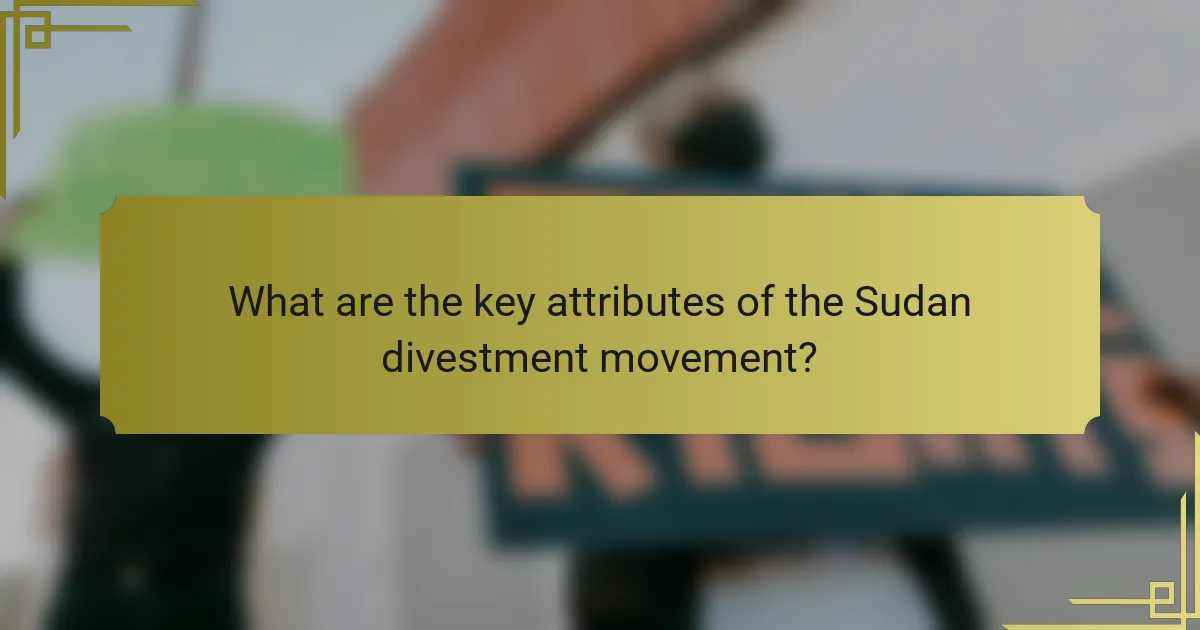
What are the key attributes of the Sudan divestment movement?
The key attributes of the Sudan divestment movement include its focus on human rights, economic pressure, and corporate accountability. The movement aims to combat human rights abuses in Sudan, particularly in Darfur. It encourages investors and institutions to withdraw financial support from companies operating in Sudan. This divestment serves as a form of protest against the Sudanese government’s actions. The movement gained momentum in the early 2000s, coinciding with increased awareness of the humanitarian crisis in Darfur. Advocacy groups, such as the Save Darfur Coalition, played a significant role in mobilizing public support. Legislative measures, like the Sudan Accountability and Divestment Act of 2007, further legitimized these efforts. The movement has influenced public opinion and corporate policies regarding human rights in Sudan.
What organizations are leading the Sudan divestment movement?
Organizations leading the Sudan divestment movement include the Sudan Divestment Task Force, the Enough Project, and Amnesty International. The Sudan Divestment Task Force focuses on mobilizing investors to withdraw funds from companies operating in Sudan. The Enough Project advocates for policy change and raises awareness about human rights abuses in Sudan. Amnesty International campaigns for global human rights and encourages divestment as a means to pressure the Sudanese government. These organizations collectively work to promote human rights and accountability in Sudan through divestment initiatives.
How do these organizations coordinate their efforts for maximum impact?
Organizations coordinate their efforts for maximum impact through strategic partnerships and collaborative initiatives. They share resources, information, and best practices to enhance their collective influence. Regular communication and joint campaigns ensure alignment of goals and messaging. Utilizing data-driven approaches allows organizations to measure impact effectively. They often engage in advocacy efforts that amplify each other’s voices. By leveraging social media and public relations, they reach broader audiences. Participation in coalitions strengthens their bargaining power with policymakers. These coordinated efforts lead to more significant pressure for change in Sudan.
What strategies do they employ to raise awareness and support?
Advocacy groups employ various strategies to raise awareness and support for Sudan divestment. They utilize social media campaigns to reach broader audiences and engage supporters. Public demonstrations and rallies are organized to draw attention to human rights abuses in Sudan. Educational workshops and seminars are conducted to inform the public about the implications of divestment. Collaborations with influential figures and organizations amplify their messages. They also produce reports detailing the human rights situation in Sudan, providing concrete evidence for their claims. Grassroots mobilization efforts help to build a community of advocates. These strategies collectively enhance visibility and encourage public participation in the divestment movement.
What challenges does the Sudan divestment movement face?
The Sudan divestment movement faces several significant challenges. One major challenge is the lack of political will among key stakeholders. Many governments and institutions are hesitant to take strong stances against Sudan due to geopolitical interests. Additionally, there is often insufficient public awareness about the human rights violations occurring in Sudan. This lack of awareness can lead to limited support for divestment initiatives.
Another challenge is the complexity of global supply chains. Companies may find it difficult to trace their investments back to Sudan, making it challenging to implement divestment effectively. Furthermore, there are legal and financial repercussions for companies that divest from Sudan. These potential costs can deter organizations from participating in the movement.
Lastly, internal divisions within advocacy groups can weaken the movement’s effectiveness. Disagreements on strategies and priorities can lead to fragmented efforts. These challenges collectively hinder the Sudan divestment movement’s progress and impact.
How do political and economic factors hinder divestment efforts?
Political and economic factors significantly hinder divestment efforts. Governments often prioritize economic stability over human rights concerns. This can lead to policies that discourage divestment from countries like Sudan. Economic interests, such as trade relationships, can influence decisions to maintain investments. Additionally, political alliances may pressure entities to avoid divestment. For example, nations with strategic interests in Sudan may lobby against divestment initiatives. This creates a challenging environment for human rights advocates. Consequently, the interplay of political and economic motivations complicates efforts to promote divestment for ethical reasons.
What are the responses from the Sudanese government to divestment campaigns?
The Sudanese government has responded to divestment campaigns with strong denials and accusations. They claim these campaigns are politically motivated and aim to destabilize the country. The government has also emphasized its commitment to economic reform and attracting foreign investment. Additionally, they have threatened legal action against companies that divest. The Sudanese leadership argues that divestment harms the Sudanese people and undermines progress. They assert that the international community should support Sudan’s sovereignty instead of endorsing divestment. These responses reflect the government’s stance on maintaining economic stability amid external pressures.
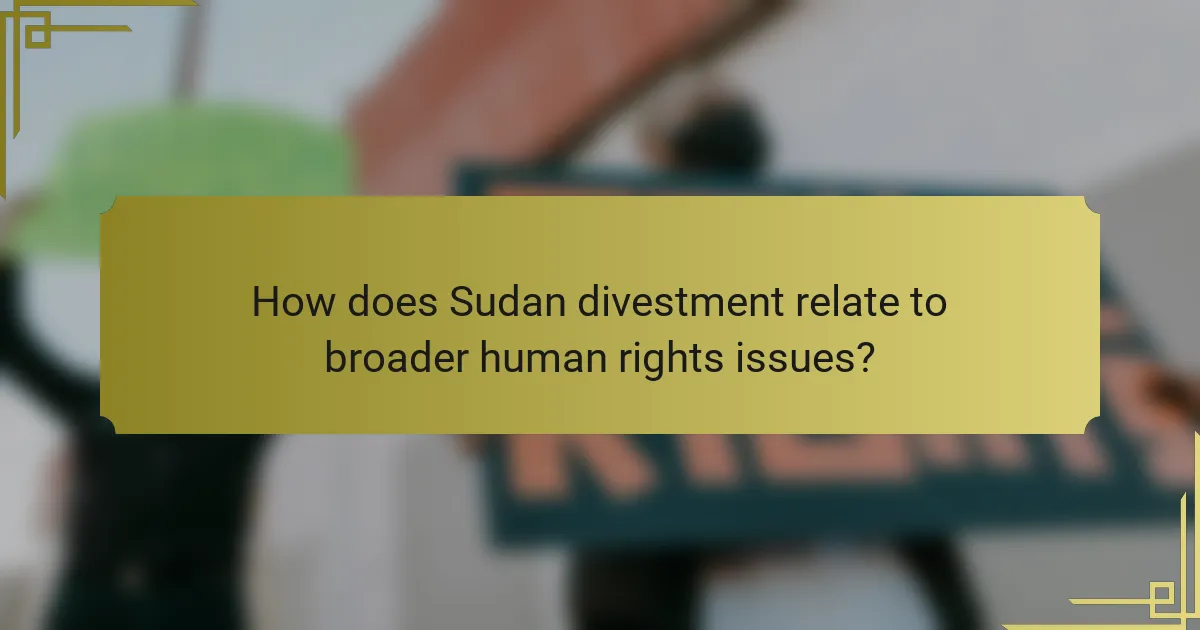
How does Sudan divestment relate to broader human rights issues?
Sudan divestment is a response to the country’s ongoing human rights violations. This divestment involves withdrawing investments from companies operating in Sudan. It aims to pressure the Sudanese government to improve its human rights record. The relationship between divestment and human rights advocacy is significant. Divestment serves as a tool for activists to highlight abuses. For example, the Darfur conflict has led to widespread condemnation. In response, various organizations have called for divestment from companies linked to the Sudanese regime. This strategy seeks to align economic actions with ethical considerations. Ultimately, Sudan divestment represents a broader movement advocating for human rights globally.
What other human rights abuses are connected to the situation in Sudan?
The situation in Sudan is connected to various human rights abuses, including widespread violence against civilians. Reports indicate systematic killings and attacks on civilians by armed groups. Additionally, there are documented instances of [censured] violence used as a weapon of war. Forced displacements of populations due to conflict have also been prevalent. Arbitrary arrests and detentions of political opponents are common. Freedom of expression is severely restricted, with journalists facing harassment and violence. Humanitarian access is often denied, exacerbating the suffering of affected populations. These abuses are part of a broader pattern of human rights violations in the context of ongoing conflict in Sudan.
How does divestment address these broader human rights concerns?
Divestment addresses broader human rights concerns by withdrawing financial support from entities that violate human rights. This action signals disapproval of unethical practices, such as oppression or discrimination. When investors divest, it reduces the financial resources available to these entities. Consequently, it may pressure them to change their behavior to regain investor confidence. Historical examples show that divestment campaigns have successfully influenced policy changes. For instance, the divestment movement against apartheid in South Africa significantly contributed to the end of that regime. In the context of Sudan, divestment can target companies involved in human rights abuses, thereby fostering accountability. This strategy aligns financial decisions with ethical considerations, promoting a culture of responsibility among investors.
What lessons can be learned from the Sudan divestment movement for future advocacy?
The Sudan divestment movement teaches several key lessons for future advocacy. First, targeted financial pressure can effectively influence policy change. The movement successfully prompted companies to withdraw investments from Sudan due to human rights violations. Second, coalition-building among various stakeholders enhances advocacy efforts. Diverse groups united for a common goal, increasing visibility and impact. Third, public awareness campaigns are crucial. The movement raised significant awareness about the crisis in Darfur, mobilizing public opinion. Lastly, leveraging social media can amplify advocacy messages. The Sudan divestment movement utilized online platforms to reach a broader audience. These lessons highlight the importance of strategic planning, collaboration, and communication in effective advocacy.
What best practices can enhance the effectiveness of divestment campaigns?
Effective divestment campaigns can be enhanced by several best practices. First, building a strong coalition of stakeholders increases credibility and reach. Engaging with community leaders and organizations fosters broader support. Clear communication of goals and strategies helps to unify efforts. Utilizing data and case studies can illustrate the impact of divestment on targeted entities. Social media campaigns can amplify messages and mobilize grassroots support. Regular updates and transparency maintain momentum and trust among supporters. Targeting specific financial institutions can create pressure for change. Lastly, aligning divestment efforts with broader social justice movements can strengthen overall advocacy.
How can advocates better engage the public in divestment efforts?
Advocates can better engage the public in divestment efforts by utilizing clear communication strategies. They should focus on educating the public about the implications of divestment. Providing accessible information on how investments affect human rights in Sudan is crucial. Engaging storytelling can make the issue more relatable. Utilizing social media platforms can amplify their message and reach a broader audience. Collaborating with local organizations can enhance community involvement. Hosting events and discussions can foster dialogue and increase awareness. Evidence shows that grassroots campaigns effectively mobilize public support for divestment initiatives.
What role does social media play in promoting divestment and human rights advocacy?
Social media serves as a critical platform for promoting divestment and human rights advocacy. It enables activists to share information rapidly with a global audience. Social media campaigns can raise awareness about human rights violations. They often mobilize support for divestment from companies linked to these violations. For instance, the #SudanDivestment campaign utilized platforms like Twitter and Facebook to inform users about corporate complicity in human rights abuses. This led to increased pressure on institutions to withdraw investments. Studies have shown that social media can amplify the voices of marginalized communities. Additionally, it facilitates the organization of protests and events, furthering advocacy efforts.
The main entity of this article is Sudan divestment, which is a strategic approach aimed at advocating for human rights in Sudan by withdrawing investments from companies linked to human rights abuses. The article outlines the emergence of divestment as a response to the humanitarian crises in Sudan, particularly during the Darfur conflict, and highlights the role of international organizations in mobilizing support for these efforts. Key attributes of the divestment movement, its impact on Sudan’s economy, and the ethical implications of divestment are discussed. Additionally, the article examines the challenges faced by the movement, the responses from the Sudanese government, and the broader connection of divestment to global human rights issues.
